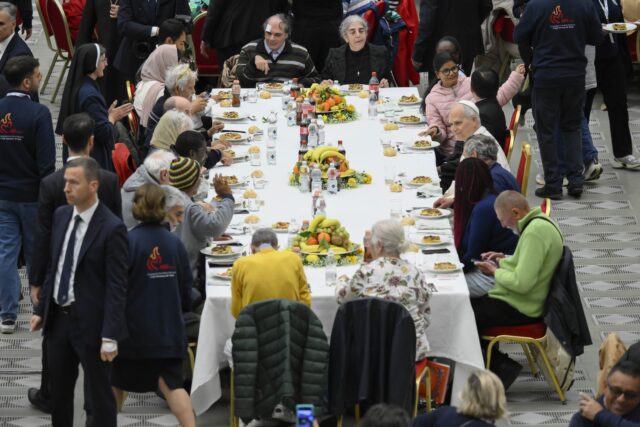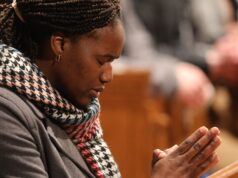
“When you are invited by someone to a wedding banquet, do not sit down at the place of honor” (Lk 14:8).
Okay, can we stipulate that a working and fully engaged pope probably does not have the bandwidth to concern himself with seating arrangements for big banquets and will entrust his staff with such details?
I ask because on the increasingly and thoroughly poisoned wells that comprise social media, I’ve read posts either denouncing Pope Leo XIV or praising him after this year’s annual luncheon, partaken of by the pontiff and some 1,300 of Rome’s destitute and unemployed on the World Day of the Poor.
The banquet was begun by Pope Francis in 2016 when he ordered the day, and the gathering, during the release of his apostolic letter, “Misericordia et misera.” Paused for two years during the COVID pandemic, Francis reestablished it again in 2022, and Pope Leo continued his predecessor’s grace-filled initiative, an event which should be unobjectionable to all people of good will.
“Should” is the operative word here, but given a forum (no matter how small or toxic), broken humanity can find a way to befoul even the purest endeavor. During Francis’ pontificate, some Catholics grumbled that too much distinction was given to representatives of the same-sex and transsexual communities, who sat at what some call “the top table,” with the pontiff.
At this year’s gathering, the pope’s tablemates were randomly selected from those among the poor who had attended the Mass that was celebrated prior to the meal. Thus, the indigent poor, the migrant poor, the helpless poor, the aged poor, the young poor, the gay poor and the trans poor were seated without distinction throughout the hall.
In this way, all of the attendees were seen and regarded as distinguished guests of the church, which — if I’m reading Jesus correctly in Scripture — is how it is supposed to be. At least twice in the Gospels, Jesus warns us not to seek out a seat of honor, either so as to avoid embarrassment if moved, or to avoid being like the Pharisees who “love the place of honor at banquets” (Mt 23:6).
Nevertheless, some progressive Catholics considered an invitation that didn’t include special seating to be a purposeful snub, while traditionalist Catholics called it a correction.
Rather than a correction, I think it was a needed clarification and reminder about what it means to be inclusive and unified with the poor, who are the great levelers of humanity, possessing no worldly hierarchy beyond their status as challenging mirrors to the more fortunate among us — living invitations to feel baffled humility at our own better circumstances, renewed understanding about the dignity of each human person, and gratitude for having the wherewithal to help and the privilege to serve.
Rather than quibbling about seating arrangements or bringing ideological lenses to events as they unspool during Leo’s pontificate (a decades-long habit that has resulted in exactly the sort of polarization the pope says is “not helping anybody”), Catholics might be better off considering how small we become when we obey those instincts — not small like those Jesus called the “little ones,” but small as in diminished and inconsequential.
When speaking of the “little ones,” Jesus warns that they mustn’t be despised or rejected, ignored or made to stumble. The vulnerability and innocence of the little ones puts their value at a premium in the eyes of God. The poor are also vulnerable, also at risk, and are probably counted among the little ones and thus treasured by the Creator — placed in our paths for our betterment.
I greatly suspect that we, all of us, are — in various ways — “little ones” to Jesus and to the Triune God who loves us and is eager to be merciful when we let go of our own sense of control and permit it.
Part of being little is to put aside our certainties, our ambitions, our ideological idols and become willing to own our vulnerabilities (because we all have them), be they emotional insecurities, attachments to worldly values, tortured self-hatred, an abiding distrust of the “others” or — perhaps greatest of all our vulnerabilities — the fear of being known to the depths of our mysterious beings, without being loved.
How fortunate, then, that God knows us through and through and understands us better than we do ourselves, whether we are among his precious “little ones” or stuck on being small.
Elizabeth Scalia is editor at large for OSV. Follow her on X @theanchoress.








